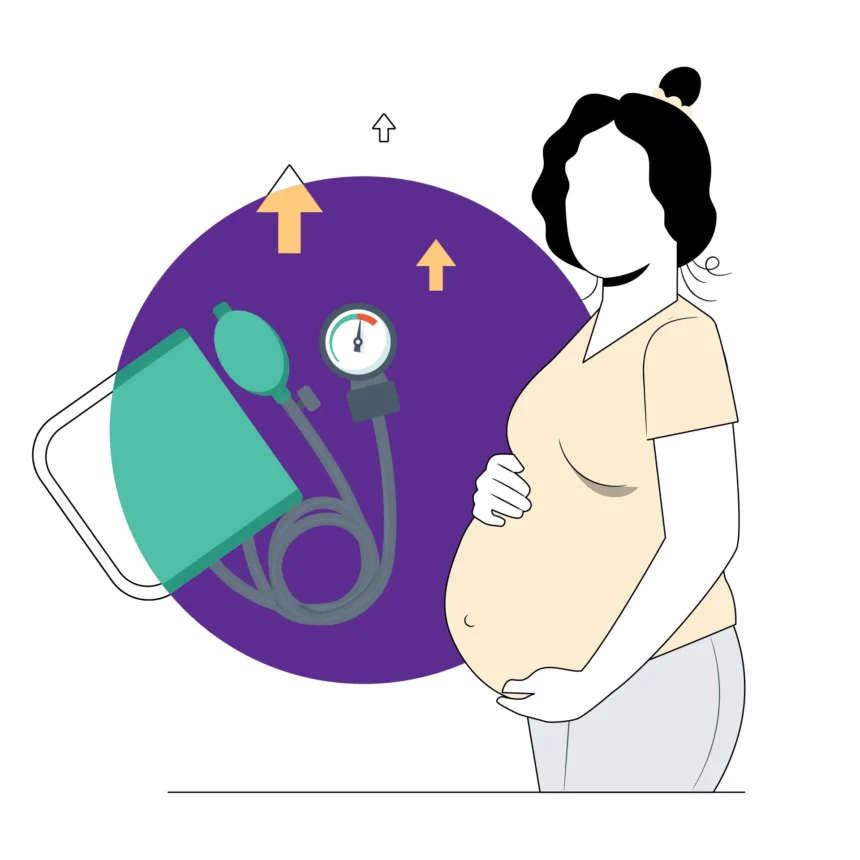Preeclampsia is a complicated illness that can strike pregnant women after the 20th week of gestation and occasionally even after childbirth. It is characterized by high blood pressure and organ damage, primarily to the liver and kidneys. If left untreated, it can cause severe consequences for both the mother and the child, including seizures, stroke, organ failure, and, in rare cases, death.
MUST READ; 6 Symptoms of Vitamin B Deficiency
Causes and Risk Factors
Preeclampsia is thought to be caused by problems with the development of blood arteries in the placenta, while the specific cause is uncertain. Normally, the placenta creates new blood vessels to feed the baby with nutrients and oxygen, but these blood vessels may not form or function properly in preeclampsia. This results in reduced blood flow, which is considered to cause maternal symptoms
Key Risk Factors
Women who are pregnant for the first time face a higher risk. Previous pregnancy history: Women who have had preeclampsia in the past are more likely to have it again. Multiple pregnancy: Carrying twins, triplets, or more raises the risk. Chronic hypertension: If the mother has high blood pressure, the risk of preeclampsia increases. Age: Women over 35 and under 20 are at a higher risk. Pre-existing conditions: Diabetes, renal illness, lupus, and obesity are all risk factors. Genetic factors: A woman with a family history of preeclampsia is more likely to acquire the illness.
Signs and Symptoms
Preeclampsia may develop gradually or unexpectedly. Some women may not exhibit any noticeable symptoms at first, although common indicators include: High blood pressure is typically the first indicator. Blood pressure values of 140/90 mm Hg or greater are alarming, especially if they occur on two occasions. Proteinuria (protein in the urine) is a key indicator of kidney involvement in preeclampsia. Severe headaches: Persistent headaches that are not eased by over-the-counter pain medications may indicate developing preeclampsia.Visual disturbances: Blurred vision, sensitivity to light, or seeing spots may suggest brain or eye damage. Upper abdominal pain: Pain beneath the ribs, especially on the right side, may indicate liver dysfunction. Sudden weight gain and swelling (edema): Although some swelling is typical during pregnancy, sudden and excessive swelling in the face, hands, or feet may indicate preeclampsia. Reduced urine output: Less frequent urination could suggest renal dysfunction.
Treatment
Preeclampsia care is based on the severity of the ailment and the stage of pregnancy. Mild preeclampsia can be controlled with diligent monitoring, including regular blood pressure and urine tests. Bed rest or less activity may be recommended. Severe preeclampsia: Hospitalization is usually required, and drugs to reduce blood pressure or prevent seizures (magnesium sulfate) may be prescribed. Early birth is sometimes the only definite treatment for preeclampsia, as the condition disappears once the placenta is removed.
Prevention
For high-risk women, preventive strategies may include: Healthcare practitioners recommend low-dose aspirin for some women with high-risk factors. Lifestyle adjustments, including maintaining a healthy weight, controlling chronic diseases, and scheduling regular prenatal checkups, can all assist in lowering risk.
In summary, Preeclampsia is a life-threatening condition that emphasizes the value of prenatal care. Early detection and quick intervention can safeguard both mother and baby, resulting in a safer pregnancy and birth.


